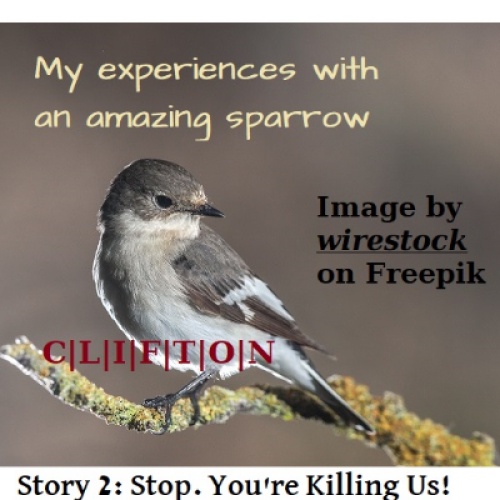With the tree cover gone, some eagles flew low, surveying the land, probably looking for a rabbit to pounce on for a delicious meal. Then a mongoose suddenly emerged from the undergrowth and ran towards the tree on which the birds were fighting. There was a hole in the ground beneath the tree and he vanished inside. A minute later, he emerged from the hole and ran back to where he started, plainly worried and distressed. That's when I realized what was happening.
The people who felled the neighboring trees destroyed their habitat. As a result, the birds and animals, dispossessed of their homes and shelters, were in a frenzy. They were trying to recover from the loss, relocating, or reconstructing new dwellings. It made me sad. When humans engage in deforestation, we unwittingly destroy their habitats and harm them severely.
After breakfast, I went to the front lobby on the ground floor to collect my mail. In this digital era, one doesn't expect anything important to arrive via snail mail, yet I performed this ritual fortnightly, just in case. I checked - nothing significant had come. However, there was a mailer from the World Wildlife Fund (WWF). Normally, such mail, though worth reading, wouldn't grip my attention strongly enough to make me want to read it immediately. But that morning was different. The sight of disturbed birds and animals was still fresh in my mind, and an article in the mailer titled, "Deforestation and How It's Killing Our Planet," piqued my interest so much, that I decided to read it immediately.
Back in my bedroom-cum-study, I slid open a window pane, sat at my computer table, powered on my desktop, and started reading the article. I had just finished noting the main detrimental effects of deforestation - habitat loss for birds, animals, and insects; ecological imbalance; reduced biodiversity; and increased vulnerability of residual species to predators - when Clifton suddenly flew in and perched on the windowsill.
"Hi, Clifton," I greeted him. "I was just thinking about you... and you flew in."
"Oiee, I am hungry, Pradeep sir," Clifton said. "Can you give me something to eat?"
Clifton had a weary appearance. His feathers were dusty, like a bird exhausted from flying long distances in search of food, but without luck. I went to the kitchen, put some rice and wheat grains in a saucer, and offered it to him. He gobbled the food up quickly, the sound of his beak striking the saucer at regular intervals like a typewriter at work.
Then he asked for water. I picked up the water jar from the dining table and poured a little into the saucer. He drank the water gratefully and looked refreshed.
"What happened?" I asked. "You look tired, hungry, and disturbed. I've never seen you like this before!"
"H-Habitat loss!" Clifton replied. During the wheat harvest, I used to camp in the mango tree outside your flat. As you know, there are several wheat fields behind your flat, and there's always plenty of grain in them for us to eat. The farmers don't mind if we eat a little. But once the harvest ends, we migrate to Akalanka Forest, about 10 kilometers from here. That's when the season for berries and rare fruits begins in the Forest.
"However, the sanctioning of the Neelkamal Ring Road project last month resulted in the cutting down of numerous trees to make way for the road. Some of those trees were our habitat. They were a lovely home for us, but now they're gone! Because of the trees and plants removed, most of the berries are gone too. So, we have little to no food. Tree trunks and slain plants now intermittently block the canal running through the forest, connecting the Suvaranarekha River and Bhagini Lake. The disrupted water flow severely limits the water reaching our former home. Moreover, the water tastes pungent and bitter, so we don't like it. We prefer to fly to the Suvaranarekha River and drink clean water there. Otherwise, we have to make do with water from the leaking water taps at the Shanta Nagar railway station or other public places."
Clifton fell silent for a moment, then lapsed into his usual philosophical mood.
"Oiee, Pradeep sir, you are killing us," he said. "No, I don't mean you personally - you are among the few kind, considerate humans we know - I mean the vast majority of humans who don't. Their only God is money, and they'll do whatever it takes to get even more of it. 'A little deforestation, a factory here and there whose wastewater pollutes a bit, a few old cars that spew out dark exhaust fumes, etc. are all in the game. The environment will take care of itself, so long as it doesn't cross a 'limit' they say.' But in reality, they inflict much more harm than the so-called 'limit,' taking a deathly toll on flora and fauna. What's worse is the toll taken is often irreversible."
"Consider this," Clifton continued. "Forests cover one-third of Earth's land (or 31%) - about 4.06 billion hectares today. But 10,000 years ago, forests covered 57% of Earth's land - that's 6 billion hectares! What wiped out so much of forests? Humans deforested vast areas for agriculture, roads, infrastructure, and mining.
"Between 1990 and 2020 alone, we lost 420 million hectares of forest. Today, 10 million hectares vanish every year. Without the shelter, food, and water the forests supply, the biodiversity that coexists within and beneath the canopy of forest trees also vanishes. As you know, trees also act as 'carbon sinks' by absorbing carbon dioxide during photosynthesis, thus holding global warming in check. Deforestation depletes the carbon sink severely and consequently, global warming gets off the hook. And as we all know well, the rise of global warming is devastating the planet, in ways big and small."
Then, in a voice choked with anguish, Clifton asked, "But who will stop it? Humans control everything. We have no voice. We are left to face the consequences of habitat destruction alone, and not knowing what to do, many of us die silently or get killed. So, it would be kind if you, sir, would spread this message among other humans, particularly your decision-makers on behalf of all non-human life that look up to you! You are killing us in huge numbers and you can stop it if you take corrective action immediately."
I was listening carefully, and I felt deeply moved, troubled, and responsible. So, I promised Clifton I would do my best to spread awareness of the evils of deforestation quickly.
I believe if you decide to do something you must act immediately to avoid falling into the swamp of procrastination and seeing the death of what you purposed to do, so I turned to my PC (which had booted fully by then) and started the word processor.
"See, I'm starting right away!" I told Clifton and started working.
"Thank you, Pradeep sir," Clifton said. Then, quite as suddenly as he had appeared, he flew away into the morning sky and disappeared.








